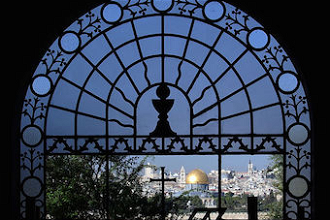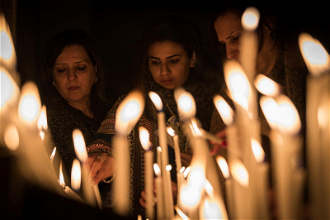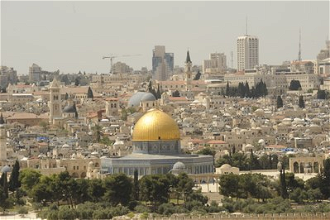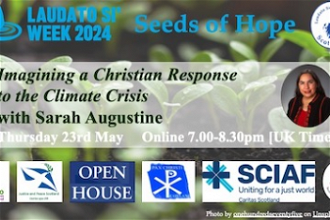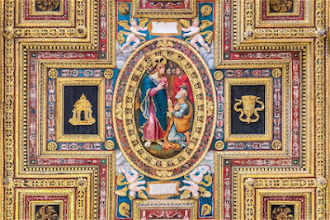Pope visits Temple Mount, meets Muslim and Jewish religious leaders
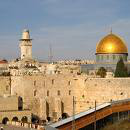
Temple Mount image VIS
Source: VIS
At 8.45 this morning, Benedict XVI arrived at Temple Mount in Jerusalem, known in Arabic as al-Haram al-Sharif (the Noble Sanctuary), the place where Solomon raised his Temple, later rebuilt by Herod at the end of the first century BC. It is also the site of two Mosques: the Dome of the Rock and Al-Aqsa.
The area of Temple Mount is dear to the followers of all three monotheistic religions; to Jews because it was where Abraham was called to sacrifice his son Isaac, as well as being the site of Solomon's temple; to Muslims who consider it the third pilgrimage site, after Mecca and Medina, and the place whence the prophet Muhammad ascended to heaven; to Christians because it was here that Christ spoke of the destruction of the Temple.
The golden-domed, octagonal-shaped Dome of the Rock is the oldest extant Muslim monument in the Holy Land. The first mosque, built in 640, was substituted in 687 by the current one. In the twelfth century it was transformed into a Christian church by the crusaders, who called it "Templum Domini," thus giving rise to the name of the equestrian order of Templars. It was restored as a Muslim place of worship by Saladin in 1187. In the centre of this sumptuously decorated mosque is the sacred rock on which Muhammad prayed before going to heaven.
The Al-Aqsa mosque, whose name in Arabic means "the furthest away", is, according to Muslim tradition, the spot furthest from Mecca, to which Muhammad was miraculously carried one night. It was built at the start of the eighth century, was destroyed by earthquakes, rebuilt, became a church of the Templars and, like the Dome of the Rock, was later restored as a Muslim place of worship by Saladin. During the 1938 restoration of the mosque, King Farouk of Egypt restored the ceiling and Mussolini donated the columns of Carrara marble.
The Holy Father arrived at the Dome of the Rock at 9am where he was greeted by Muhammad Ahmad Husayn, Grand Mufti of Jerusalem, and by the president of the Waqf council (which administers religious properties). Following a brief tour of the area, the Pope was accompanied to the "al-Kubbah al-Nahawiyyah" building, where representatives of the Muslim community were waiting to greet him.
"The Dome of the Rock", said the Pope in his remarks to them, "draws our hearts and minds to reflect upon the mystery of creation and the faith of Abraham. Here the paths of the world's three great monotheistic religions meet, reminding us what they share in common. Each believes in One God, creator and ruler of all. Each recognises Abraham as a forefather. ... Each has gained a large following throughout the centuries and inspired a rich spiritual, intellectual and cultural patrimony.
"In a world sadly torn by divisions", he added, "this sacred place serves as a stimulus, and also challenges men and women of goodwill to work to overcome misunderstandings and conflicts of the past and to set out on the path of a sincere dialogue aimed at building a world of justice and peace for coming generations.
"Since the teachings of religious traditions ultimately concern the reality of God, the meaning of life, and the common destiny of mankind - that is to say, all that is most sacred and dear to us - there may be a temptation to engage in such dialogue with reluctance or ambivalence about its possibilities for success. Yet we can begin with the belief that the One God is the infinite source of justice and mercy, since in Him the two exist in perfect unity. Those who confess His name are entrusted with the task of striving tirelessly for righteousness while imitating His forgiveness, for both are intrinsically oriented to the peaceful and harmonious coexistence of the human family".
"Fidelity to the One God, the Creator, the Most High, leads to the recognition that human beings are fundamentally inter-related, since all owe their very existence to a single source and are pointed towards a common goal. Imprinted with the indelible image of the divine, they are called to play an active role in mending divisions and promoting human solidarity. This places a grave responsibility upon us. Those who honour the One God believe that He will hold human beings accountable for their actions. Christians assert that the divine gifts of reason and freedom stand at the basis of this accountability. Reason opens the mind to grasp the shared nature and common destiny of the human family, while freedom moves the heart to accept the other and serve him in charity".
"I have come to Jerusalem on a journey of faith ... as the Bishop of Rome and Successor of the Apostle Peter", said the Pope, "but also as a child of Abraham, by whom 'all the families of the earth find blessing'. I assure you of the Church's ardent desire to co-operate for the well-being of the human family. She firmly believes that the fulfilment of the promise made to Abraham is universal in scope, embracing all men and women regardless of provenance or social status.
"As Muslims and Christians further the respectful dialogue they have already begun, I pray that they will explore how the Oneness of God is inextricably tied to the unity of the human family" and, he concluded, "continue to keep their gaze fixed on His absolute goodness, never losing sight of the way it is reflected in the faces of others".
After his address, the Holy Father continued his visit by travelling to the Western Wall, also known as the Wailing Wall, a fifteen-metre high fragment of the wall which originally supported the western side of the esplanade of the Temple in Jerusalem.
The Chief Rabbi read a Psalm in Hebrew, and the Holy Father another in Latin. Having then stood for a few moments in silence, the Pope placed a piece of paper containing a prayer into a crevice on the wall, just as John Paul II did in 2000.
Benedict XVI then moved on to the "Hechal Shlomo" (House of Solomon) Centre, so-called because it has a form that recalls Solomon's Temple. It is the headquarters of the Chief Rabbinate of Israel, of the Sephardi and Ashkenazi Chief Rabbis, and of the Supreme Religious Court.
In his discourse, the Pope thanked the two rabbis - Shlomo Amar and Yona Metzger - for "the desire they have expressed to continue strengthening the bonds of friendship which the Catholic Church and the Chief Rabbinate have laboured so diligently to forge over the past decades". He also gave assurances of his own "desire to deepen mutual understanding and co-operation between the Holy See, the Chief Rabbinate of Israel and Jewish people throughout the world.
"A great source of satisfaction for me since the beginning of my pontificate", he added, "has been the fruit yielded by the ongoing dialogue between the Delegation of the Holy See's Commission for Religious Relations with the Jews and the Chief Rabbinate of Israel's Delegation for Relations with the Catholic Church".
After highlighting how goodwill on both sides "has already paved the way to more effective collaboration in public life", he went on: "Jews and Christians alike are concerned to ensure respect for the sacredness of human life, the centrality of the family, a sound education for the young, and the freedom of religion and conscience for a healthy society. These themes of dialogue represent only the initial phases of what we trust will be a steady, progressive journey towards an enhanced mutual understanding".
"In approaching the most urgent ethical questions of our day, our two communities are challenged to engage people of good will at the level of reason, while simultaneously pointing to the religious foundations which best sustain lasting moral values".
The Pope took the opportunity to repeat "that the Catholic Church is irrevocably committed to the path chosen at Vatican Council II for a genuine and lasting reconciliation between Christians and Jews". At the same time "the Church continues to value the spiritual patrimony common to Christians and Jews and desires an ever deeper mutual understanding and respect through biblical and theological studies as well as fraternal dialogues".
"I am confident that our friendship will continue to set an example of trust in dialogue for Jews and Christians throughout the world. Looking at the accomplishments achieved thus far, and drawing our inspiration from the Holy Scriptures, we can confidently look forward to even stronger co-operation between our communities - together with all people of good will - in decrying hatred and oppression throughout the world".
At the end of the ceremony in the "Hechal Shlomo" Centre, the Pope travelled to the Upper Room or Cenacle, site of the Last Supper.



